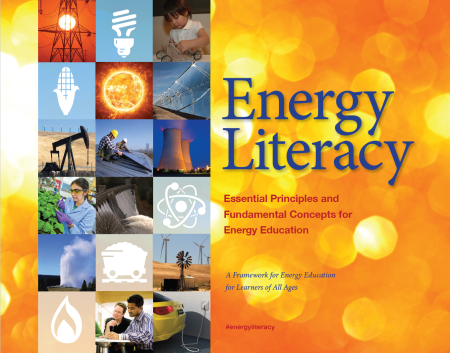Energy Literacy: Essential Principles for Energy Education

“WHAT IS ENERGY LITERACY?
Energy Literacy is an understanding of the nature and role of energy in the world and daily lives accompanied by the ability to apply this understanding to answer questions and solve problems.
An energy-literate person:
- Can trace energy flows and think in terms of energy systems.
- Knows how much energy they use, for what purpose, and where the energy comes from.
- Can assess the credibility of information about energy.
- Can communicate about energy and energy use in meaningful ways.
- Is able to make informed energy use decisions based on an understanding of impacts and consequences.
WHAT IS THE ENERGY LITERACY FRAMEWORK?
Energy Literacy: Essential Principles and Fundamental Concepts for Energy Education is an interdisciplinary approach to teaching and learning about energy. The framework identifies seven Essential Principles and a set of Fundamental Concepts to support each principle. The guide does not seek to identify all areas of energy understanding, but rather to focus on those that are essential for all citizens K-Gray. It presents energy concepts that, if understood and applied, will help individuals and communities make informed energy decisions…
HOW SHOULD WE APPROACH ENERGY LITERACY?
Energy Literacy looks at energy through the lens of natural science as well as social science. Energy issues require an understanding of civics, history, economics, sociology, psychology, and politics in addition to science, technology, engineering and mathematics. A comprehensive study of energy and curriculum designed using Energy Literacy should be interdisciplinary and use a systems-based approach to fully appreciate the complexities of energy issues.”
